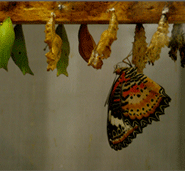Narrator: These are vignettes from the life of Sudhanva Deshpande who has been closely associated with the radical theatre group, Jan Natya Manch for several years and is an editor at Left Word Books. In this short sketch he speaks of his childhood which was set against the backdrop of a Hollywoood Western; to what cycling, doing theatre and witnessing his greatest inspiration being killed on the streets of India means.
Scene 1: School days and Street
Sudhanva Deshpande: I went to several schools in Delhi, Bombay and Germany. During my schooldays the street for me was never a busy road. I grew up on the campus of Jawaharlal Nerhu University which was like the set of a cowboy Western- dry, dusty, rocky, thorny. In the summer we would pick wildberries and I would have cuts from thorny bushes. It was in my late teens that I encountered the street through the street theatre I started doing.
Now the street evokes life, bustle, sounds, smells, lots of colour for me. What I like about Indian streets is the alive Indian culture. There is a culture of public debate and discussion. Streets are where opinions get aired and formed.
The Street is also a dramatic backdrop to a play- one that you cannot replicate in a proscenium space. I love the unpredictability of performing on the street leading to moments that are really alive.
Scene 2: Monologue and Cafe
Sudhanva Deshpande: I think of the Cafe as a resting place. A space to sit down and ingest. It is antithetical to monologue. It is a place of dialogues, conversations with books, coffee, the self and others.
Scene 3: Reading and drama
Sudhanva Deshpande: Professionally, as an editor of the Left Word and and a theatre person (in my involvement with Jan Natya Manch) I am constantly dealing with words. However, when it comes to a play I cannot relate to the written word. I either need to see it performed or hear it read to me. I like to read on theatre. Drama as literature does not interest me. The act of theatre is of great interest to me and here I do not simply mean the performance of a play. the act of theatre includes a bunch of people getting together, their interacting with a play script, negotiations between actors/ directors/ scenographers. The life of a play not simply between the performer and the spectator during a performance and but lives on among spectators as a response to the play which comprise the act of theatre.
Scene 4: Cycling and mohalla
Sudhanva Deshpande: When people see me on my cycle they slow down, wave show me the thumbs up sign. If it is a school bus I'm cycling beside, it erupts with children cheering, clapping, pointing at me. Often people on two-wheelers slow down and show their appreciation for how healthy it must be for me to cycle. To them, my response is that my cycle is good for your health too.
I think cycling is the future. It carries a great sense of liberation. Historically, the working class and women have benefitted greatly from the cycle. In fact, growing up everyone had a cycle. the mohalla will be a happier place if more people were to take to cycling.
Scene 5: "The end is where we start from"
Sudhanva Deshpande: After so many years of the killing it is still hard for us to believe that Safdar (Hashmi) is not between us. The attack lead us try to make sense of the world, politicised us. The fifteen thousand people at his funeral created a seminal moment in the history of the Arts.
The Studio, the book store, the cafe are all Safdar's vision. He articulated all of this at the age of 34years. He was a man with a great vision, very grounded and non-sectarian. He had an enormous ability to draw people of different agendas, people with political and non-political affiliations. Safdar, to date, is a huge inspiration for me.
The interview is done and the house lights come on (literally so, as the electricity supply is back in the small cafe in Shadipur, Delhi). Sudhanva Deshpande readies himself to perform, in interesting permutations/ combinations, the role of the actor, cyclist, editor, barista and theatre-director.
Sudhanva is an actor and director living and working in Delhi.
Some of the Janam plays directed by Sudhanva Deshpande are: Satyashodhak (1992) written by: G.P. Deshpsnde, Azadi ne jab dastak di (2001) written by: Brijesh & Sudhanva Deshpande, Bush ka matlab Jhari (2003) written by Janam, Shambhuk Vadh (2004) written by: Brijsh, Ulte Hor Zamane Aaye (2008) written by: Brijsh, Char Rang (2010) written by: Brijsh.
In conversation with Manjari Kaul, a writer and actor living in Delhi.










